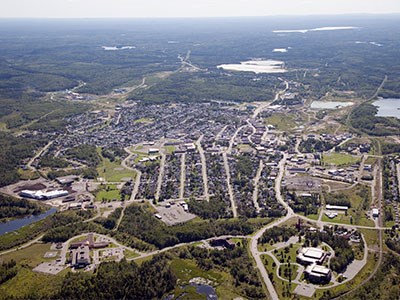Kirkland Lake is looking to play its way into the sports tourism field.
While nothing will come close to replacing gold mining as the town’s main industry, sports tourism is being suggested as one way to promote economic diversification in the northeastern Ontario community of 9,000.
Wilf Hass, the town’s economic development and tourism director, finds there are no magical fixes to bring outside opportunities in. The solutions must come from within.
“It’s going to be incremental steps and, most importantly, it’s working with what you already have that’s been successful.”
Last year’s community strategy planning exercise demonstrated that the town has a very successful event tourism strategy through its festivals committee.
“Looking at that,” said Hass, “what can we do that is similar, but different?”
At the same time, the town is planning construction for a new municipal pool next spring and renovations are coming to Civic Stadium to create more of an outdoor multi-use complex.
Hass said for a minimal amount of money, a recreational pool can be upgraded to a competitive venue.
“We host four (swim) events a year, why can’t we increase that to six to eight?”
The sports tourism concept was introduced at a public meeting in June and immediately stirred much discussion.
Hass was surprised that many user groups have latched onto this concept “so aggressively” with ideas on how best to coordinate this, and what role can the town play?
He expects sports clubs and school boards will likely take the lead in pursuing these events based on their regional connections.
Kirkland Lake doesn’t have large blocks of hotel rooms and restaurants to host national and provincial events. But it does have a sporting chance at landing regional events that last 1.5 to two days.
A major score is the opening of a new Microtel Inn this summer, adding an extra 70 rooms to the town’s accommodations mix.
Hass cautions that everyone must be pragmatic in realizing that hosting sporting events are not major revenue generators for the clubs and the municipality.
“The real reason you’re doing it is to support the small business sector. They sell the extra rooms and extra meals, they employ the people and do the sponsorships.”
A consultant’s report highlighted a swim meet last April that attracted 120 swimmers and 100 spectators, with 80 of them staying overnight.
Using the Ministry of Tourism’s regional economic impact model, that kind of event brought more than $25,000 into town on a weekend.
Pursing opportunities in sports tourism and the biomass forestry sector were two items that emerged from the strategic planning sessions, which included an economic development synopsis on threats and opportunities.
Hass expects more grass roots ideas will come forth once an economic development advisory committee is struck this fall.
There’s always a healthy dose of public cynicism on whether strategic plans ever produce tangible results, he said.
But he noted much growth potential exists in the mining and forestry sector to improve the town’s commercial and industrial base and ease the tax burden on the small business sector.




